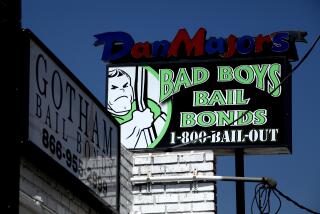Preliminary Hearings Risk Fairness for Justice
It surely is no consolation to movie mogul Robert Evans--named in court this week as having ordered the 1983 murder of producer Roy Radin--but defense lawyers ardently support the California criminal procedure known as the preliminary hearing.
It was during such a pretrial proceeding that a witness named William Rider testified Tuesday that he had heard a defendant in the “Cotton Club” murder case mention Evans’ name in connection with Radin’s killing.
While defense attorneys approve of the preliminary hearing system because it gives them a chance to review prosecutors’ cases, prosecutors often complain that defense lawyers use them to endlessly drag on criminal cases. And for those like Evans, accused of a murder during the proceeding without ever having been formally charged, there is little legal recourse.
“What is said in a legal proceeding has absolute privilege,” Los Angeles County Public Defender Wilbur Littlefield said. “You can’t file a defamation action. You just have to take it. There’s no question that it’s unfair.”
A preliminary hearing is a pretrial criminal procedure intended to satisfy a judge that the government has sufficient evidence--or probable cause--to prosecute a person. Thirty-two states, including California, require such hearings, and 25 use them instead of grand juries.
In the “Cotton Club” case, four defendants are being charged with murdering Radin, a New York theatrical producer. Although the former Paramount Pictures production chief has not been charged in the case, prosecutors have pointedly refused to rule him out as a murder suspect.
As a result, when Evans was called as the first witness in the preliminary hearing, he declined to answer any questions on the advice of his attorney, invoking his Fifth Amendment right against self-incrimination.
California’s municipal courts conduct about 100,000 felony preliminary hearings annually, at a cost of about $65 million. Most of them last less than half an hour, although a few can drag on for many months, such as in the McMartin child molestation case and the Night Stalker case here in Los Angeles.
Supreme Court Ruling
In California, a 1978 state Supreme Court ruling granted criminal defendants the right to have preliminary hearings even after an indictment by a grand jury, whose proceedings take place behind closed doors. As a result of that ruling, the use of grand juries to indict criminal suspects has become practically a thing of the past.
Prosecutors generally are not critical of preliminary hearings per se, although they often complain of their length, blaming defense lawyers.
Los Angeles Assistant Dist. Atty. Curt Livesay said he and many other prosecutors throughout the state would like to go back to the option of using either a grand jury indictment or a preliminary hearing, thus taking away a defendant’s right to preliminary hearing even after a grand jury indictment.
Had this option been available, Livesay said, a grand jury proceeding might have prevented Evans’ name from surfacing publicly as a possible murder suspect.
In rare instances--although not in the “Cotton Club” hearing--a judge can close a preliminary hearing to the public and the press. It can be done, for instance, if a judge believes that a defendant’s right to a fair and impartial trial may be jeopardized by undue publicity resulting from the proceeding.
Sufficient Suspicion
In preliminary hearings, the same rules of evidence generally apply as in trials. At the end of the hearing, the presiding judge--Municipal Judge Patti Jo McKay in the “Cotton Club” case--must decide whether a crime has been committed and, if so, whether there is sufficient suspicion that a defendant committed that crime.
If so, the judge will order the case transferred to Superior Court for arraignment and trial. Otherwise, the case is dismissed.
Criminal defense lawyers tend to prefer preliminary hearings to grand jury proceedings because, they say, it gives them a chance to preview the prosecution’s case, typically through extensive questioning of witnesses and a thorough examination of documents.
“In preliminary hearings, you get a look at what you’re up against. It’s a very fair system,” said F. Lee Bailey, the Boston-based defense lawyer who frequently appears in California courts.
Expedite Proceedings
Preliminary hearings can also serve to expedite proceedings by prompting some defendants to plea bargain, having been convinced of the strength of the prosecution’s case, said Charles Sevilla, a prominent San Diego criminal defense lawyer.
Sevilla, Bailey and most defense lawyers are vigorous supporters of preliminary hearings.
“I favor them,” Bailey said. “They are terribly important. And yet, the consequences can be very severe--even if a person is eventually acquitted at trial, especially if you are a businessman.”
More to Read
Sign up for Essential California
The most important California stories and recommendations in your inbox every morning.
You may occasionally receive promotional content from the Los Angeles Times.










